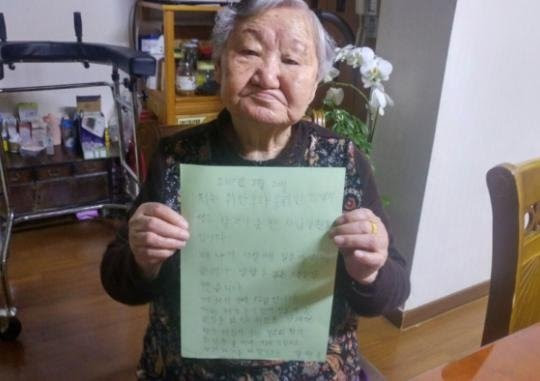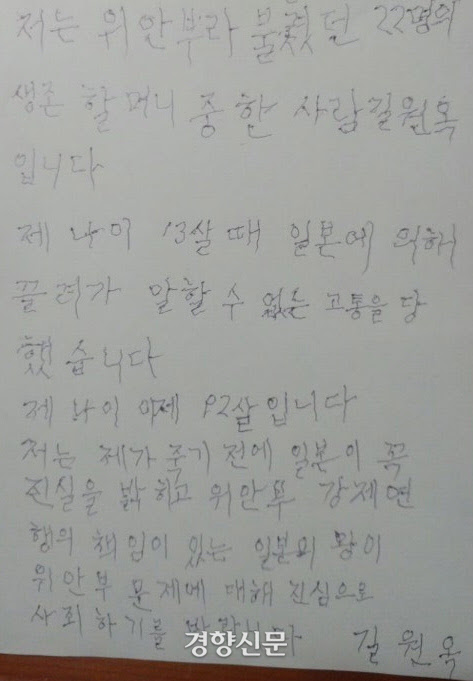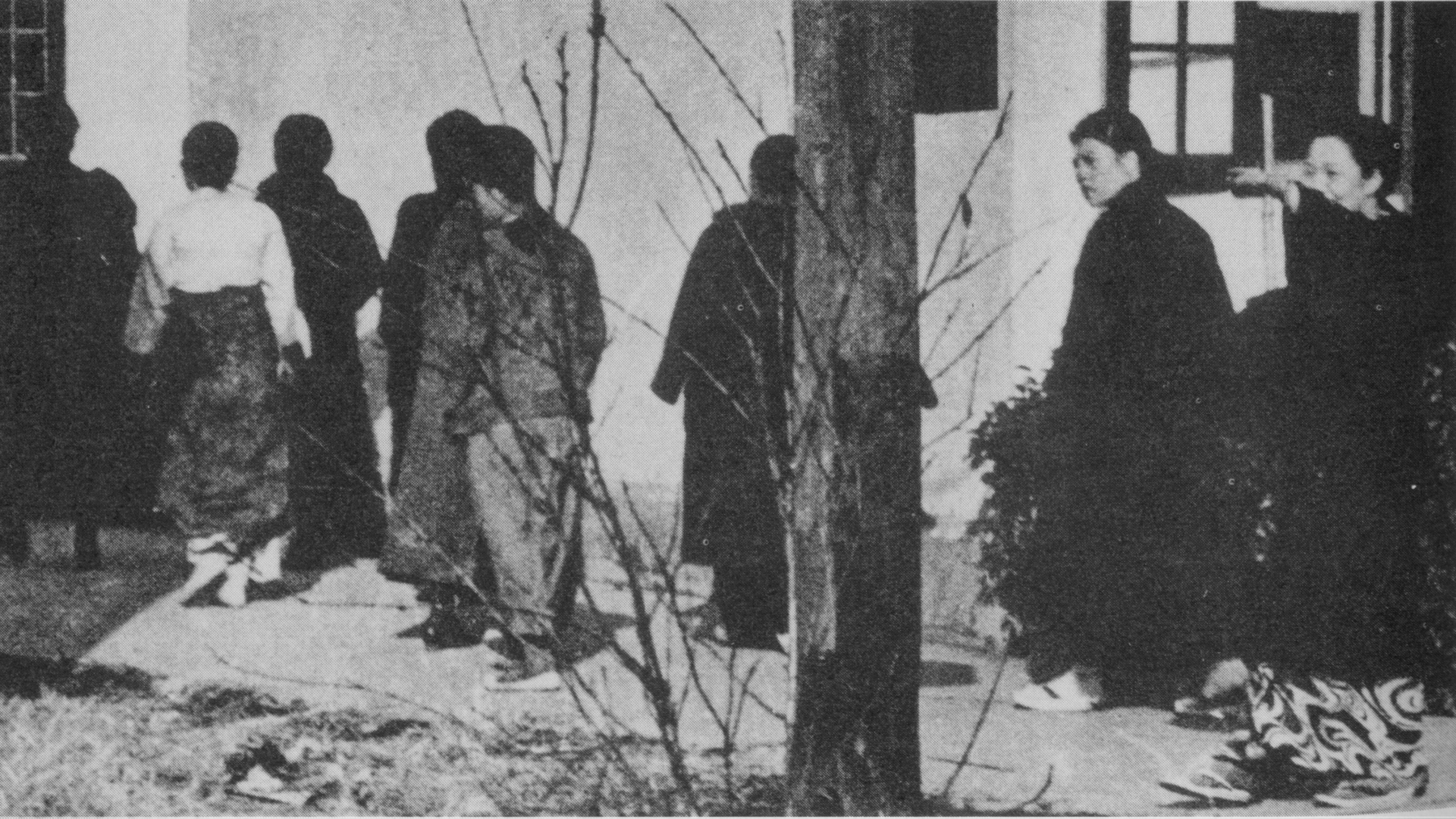The Kyunghyang Shinmun, April 18, 2019
By Kim Chan-ho

Letter sent to Kyunghyang Newspaper from a Japanese military ‘Comfort Women’ victim Won-ok Gil, (92). Courtesy of the Korean Council for the Women Drafted for Military Sexual Slavery by Japan.
“I am now 92-years old. My wish before I die, is for the truth be revealed and to receive your sincere apology…”
Sometimes you don’t have to read all of a text to know what someone is trying to say. The deep intention in the labored handwriting, and the name of the sender says it all. The letter sent to Kyunghyang Newspaper on the 20th of last month was one such letter.
The sender of the letter was born in Pyongyang in 1927. The year she turned 13 (actually 11 in Western age), soldiers dragged her away forcibly to a battlefield, where she suffered unimaginable horrors. 80 years have passed since then. At the ripe age of 92, she still isn’t asking for much. She is still waiting for sincere remorse and apology from the perpetrator, the minimum you could expect of a human with a conscience.
The recipient of the letter was born in 1933, in Tokyo, Japan. When he was 12 years old, he witnessed cities turned into rubble because of a war his father initiated. As He grew up, he became widely known as a pacifist. Another 80 odd years have passed since then. At 86, on April 30th, he will retire from his life’s work.
The sender of the letter is Won-ok Gil, a “comfort women” victim of the Japanese military. The recipient, the Japanese Emperor Akihito. On the eve of the abdication of the current Japanese Emperor, this is the last letter from the victim of the Japanese military “comfort women” system to the Japanese emperor.

Letter of the Grandma Won-ok Gil, victim of the Japanese military “comfort women”. Courtesy of the Korean Council for the Women Drafted for Military Sexual Slavery by Japan.
Contents of the letter:
My name is Won-ok Gil, and I am one of the 22 surviving victims who were called “comfort women.”
When I was 13 years (11) old, I was forcibly dragged away by Japan and went through unspeakable pain and suffering, the horrors of which I cannot speak of.
I am now 92 years old.
Before I die, I want Japan to reveal the truth, and I also want the Emperor of Japan, who is responsible for forcibly kidnapping the “comfort women” to sincerely apologize for the “comfort women” issue.
The abdication ceremony of the Emperor Akihito began on the 12th of last month. He has kept the position of the Japanese emperor for 30 years since he came to the throne in 1989. Until the final abdication ceremony on April 30th, various events will be held in Japan. The Emperor’s abdication in Japan also means that an era with a reign name (currently Heisei, associated with the reign of a specific emperor) has ended.
However, the abdication has a great significance for the Emperor Akihito himself because it also means that he can now put down the heavy burden he has been carrying all his life. That is because like it or not, the Emperor cannot be free from the responsibility of war.
Some people criticize such opinions to be a “violation of taboo”. Demanding an apology from the Japanese emperor is blasphemy, they say. It isn’t a reaction that only occurs in Japan. Some Koreans ask “Why do you demand an apology from the Emperor who isn’t directly related to the war?” or they say, “The Emperor has already apologized.” They argue that the Emperor Hirohito’s remark of “sincere regret” in 1984 and the Emperor Akihito‘s “thought of deep regret“ in 1990 were apologies.
I am not going to nitpick here. Let’s just look at the facts. The first incident that publicized the “comfort women” issue was the late Grandma Hak-soon Kim’s public testimony in 1991, and the first time the Japanese government acknowledged the “comfort women” issue was in 1992. If that is the case, the apologies from the Emperor Hirohito in 1984 and the Emperor Akihito in 1990 would have been directed to the “comfort women” victims who hadn’t even been acknowledged to exist. In that case, there are two possible explanations for it. Either the Japanese emperor was the one who ordered the mobilization of the “comfort women,” or he knowingly ignored it. Either way, it refutes the Japanese Royal family’s argument that they bear “no responsibility for the war.” \
Some people consider the demand for an apology from the Japanese emperor to be a violation of diplomatic protocol. They say it’s a result of a blind anti-Japanese sentiment that ignores reality. In fact, the Korean media may be responsible for such claims, because the media tends to focus on heart-wrenching ‘anecdotes’ rather than focusing on the ‘relevant facts’ with respect to wartime responsibility.
‘Empathy’ and ‘Responsibility’ are two very different things. In order to demand ‘accountability’- not empathy – for war crimes, we need to trace the relevant facts and reveal those responsible. In that sense, the ‘letter’ from Grandma Gil reveals the hidden perpetrator responsible for the war.
■“Why should I apologize for the crimes of the past generation?”
At the root of the current deadlock in the “comfort women” dispute lies the question, who is the person ultimately responsible (for the war)? When her defeat was apparent, Japan systematically burned most of the documents relevant to its war crimes. This led to a controversy as to ‘who, why, and how much’ responsibility should be attributed for the war. This is also the reason why the focus turns to “humanitarian assistance”, rather than the “legal responsibility”. This problem will only become more serious over time because the generations that experienced the war will soon be replaced with the generations who only “learned” about the war.
Here is an example that demonstrates the change. During a panel discussion led by Professor Michael Sandal of Harvard University at NHK in 2014, a Japanese student said, “I don’t understand why I have to apologize for the actions committed by the previous generation.” What should we say to the Japanese who were born after the war? Some say that they demand the accountability from the ‘Japanese government’, not the ‘Japanese people.’ However, the ‘legitimacy’ on which the political authority of the Japanese government is based is not the same before and after the war. The Japanese government before the war was appointed by the Emperor of Japan under the ‘Meiji Constitution,’ whereas the Japanese government after the war was established by the actions of the Diet (the Japanese National Assembly), based on the ‘Constitution of Japan.’
Furthermore, although inadequate, the key leaders in the wartime government were punished through the “Tokyo Tribunal.’ At least on the surface, the GHQ of the Allied Forces that occupied Japan created a Japan that has been ‘severed from the war.’ If that’s so, is there no way to demand Japan’s accountability for its crimes?
Actually, there is only one thing in Japan that hasn’t changed. It is the entity of the ‘Japanese Emperor.’ Article 1 of the Meiji Constitution states that ”the Great Empire of Japan is ruled by the Emperor of the unbroken genealogy for eternal ages”. The current Article 1 of the Constitution of Japan also begins with “The Emperor is the symbol of Japan and the symbol of national unity.” Both constitutions clearly state that the Emperor has the power to appoint the government. The Emperor Hirohito gave the final approval of the establishment of both the pre-war and post-war Cabinet.
Ultimately, the existence and authority of the Emperor is the only connecting link between the Japanese government of the two eras that were severed in 1945. That is, if we can demand the Emperor to be held accountable for the war. However, in practical terms, this is impossible. It’s not so much due to the fact that the Emperor Hirohito has already died, or that the Emperor can’t engage in a political action, such as ‘apologizing.’ The real reason why it is not possible is because the Japanese emperor has already been exonerated from the responsibility for the war by the United States and the head of the GHQ, Douglas MacArthur.
■Is the Emperor a pacifist? The beginning of the myth of the “Holy Decision”
Emperor Hirohito reigned from December 1926 to January 1989, a period known as the Showa Era. Having experienced both the periods of Japanese Imperialism and modern Japan, he underwent a dramatic transformation from ‘the chief of war’ to ‘the protector of the peace constitution’.
“Indeed, we declared war on America and Britain out of our sincere desire to insure Japan‘s self-preservation and the stability of East Asia, it being far from our intention either to infringe upon the sovereignty of other nations or to embark upon territorial aggrandizement. But now the war has lasted for nearly four years…”
This is a passage from the so-called “Jewel Voice Broadcast” of the Emperor Hirohito on August 15, 1945, announced at noon. Many people believe this announcement by the Emperor Hirohito was a ‘Declaration of surrender.’ However, this document is in fact referred to as the “cessation of war speech” because neither the words “defeat” nor “surrender” were ever used not even once in a speech of approximately 800 characters. In this document, the war which the Japanese Emperor was declaring an end to was that with the United States and the United Kingdom. In other words, it was the end of the war that began with the Pearl Harbor attack in December 1941. At this time, no one even cared about the Korean peninsula.
The following passage explains the reason for ending the war. “The enemy has begun to employ a new and most cruel bomb… taking the toll of many innocent lives. Should we continue to fight, it would not only result in the ultimate collapse and obliteration of the Japanese nation, but also it would lead to the total extinction of human civilization.” In other words, the US atomic bomb killed innocent Japanese people. Therefore, the Emperor decided to end the war in order to stop the sacrifice. This was the beginning of the problematic myth of the “Holy Decision.”
■“Liberate the Japanese Emperor from the war responsibility”
Led by MacArthur, the GHQ exonerated the Emperor from responsibility for the war. The “cessation of war speech” was the main basis for the indemnity that established the Emperor as a ’pacifist‘. Dr. Sang-ho Lee of the Institute for Military History said, “The Japanese historical revisionism originated from the minimizing actions of the US in dealing with the war criminals after the US occupied Japan”. These are the facts behind this claim. In July 1945, when the end of the war was imminent, the United Nations War Crimes Commission began to make a list of war criminals. At the time, China, Australia, New Zealand, the Soviet Union, and the Netherlands and others were of the position that the Emperor Hirohito should be referred to the war crimes tribunal.
But the position of the United States was different. Joseph Grew, then US Under Secretary of State, sent a letter to the Secretary of State in August 1945, arguing against prosecuting the Emperor of Japan for War Crimes. ”If the Emperor were to be prosecuted for war crimes while lacking evidence as a war criminal and uncertainty whether he played a role as a military leader, the entire Japanese people will unite to oppose it.“
Since then, the position of the US government has been consistent. On September 22, 1945, the US government gave General MacArthur specific instructions for the war tribunal. Item 17 of the 17 instructions was ”to not take any action that charges the Japanese Emperor as a war criminal without a specific instruction.“ Furthermore, the US State Department’s Acheson advised, ”If we want to use Hirohito, we shouldn’t make him resign from his position as Emperor.“
In January 1946, the Australian Government notified the US of the selection of 62 major war criminals, including Emperor Hirohito. MacArthur protested and told the Chairman of the Joint Chiefs of Staff of the Allied Forces, ”I conducted a war crimes investigation on Hirohito, but I did not find any concrete evidence.“ He further explained the practical reasons why he opposed taking the Japanese Emperor to the tribunal as follows: ”If a riot were to break out against prosecution of Hirohito, hundreds of thousands of additional troops will be needed. We must prepare to pardon Hirohito.”
Finally, the United States agreed with the United Kingdom not to prosecute the Japanese Emperor in February 1946. This agreement ended the discussion about the war responsibility of the Japanese Emperor. This is the reason it is argued that Hirohito was exonerated – not because he was free of criminal charges – but to benefit US occupation policy.
Then, the Emperor transformed himself into a “pacifist” according to the will of the United States. On January 1, 1946, he issued the “Declaration of Humanness,” denying the concept of him being a “living god’. In the declaration, emphases were made on such words as “peace”, “love for mankind”, and “welfare”. Public opinion also responded to this. According to a poll conducted on Aug. 15, 1948 by the Yomiuri Shimbun, 68.5% of the respondents opposed the abdication of the Emperor, while only 4% wanted the Emperor to abdicate and abolish the emperor system. After all, the Japanese Emperor was not prosecuted for any war crimes, nor did he leave his post after the war ended.
■ I urge you to offer a sincere apology so as to be forgiven in an ‘honorable’ manner
Last month, Chairman of the National Assembly Moon Hee-sang referred to Emperor Akihito as the son of a leading war criminal, and said “It will only take one word from the Japanese Emperor to resolve the “Comfort Women” issue. All he needs to do is to hold the elderly “comfort women’s” hand, and say he is truly sorry.“
When this made the news, the Japanese Prime Minister Abe said on the 12th of last month, ”I was really surprised to read the remark. I strongly protested that it is extremely regrettable. “ On the same day, the Foreign Minister Kono Taro also said, ”It’s impossible to accept (what he said). It was a very rude remark.” It‘s been over a month, but there is no sign that the attacks of the Japanese political establishment regarding the remarks will end. On the 27th of last month, Chief Cabinet Secretary Suga Yoshihide said, “It doesn’t even occur to me to make any comment on the remark of the Chairman of the Korean National Assembly because it was too inappropriate.” For Japanese conservatives, the ’‘Holy Decision” is not just a myth.
In Korea, some people responded that ”It’s discourteous to the Emperor Akihito, who is a pacifist.“ Indeed, Akihito said in 1998 that ”At one period, Japan brought great suffering on the people of the Korean Peninsula. The deep sorrow that I feel over this never leaves my memory.” He also paid respect at the Korean Peace Memorial for the Koreans fallen and vanished in Saipan during WWII when he visited Saipan in 2005.We can’t argue about the personal beliefs of the Emperor Akihito. However, the Japanese royal family has been exonerated from war crimes on the basis of being “pacifist.” At the time of the “Declaration of Humanness,” Emperor Hirohito justified the exoneration based on the “pacifist” tradition in the Japanese Imperial family.
There is almost no chance that the letter of the Grandma Gil Won-ok will be delivered to the Japanese Emperor. There may be nothing the Emperor can do even if the letter is delivered to him because the “comfort women” issue has already become an inter-governmental issue. Once any issue becomes a “historical issue” or a “political issue,” common sense no longer applies. The common sense premise, “If you did wrong, you should apologize” fades, while “diplomatic rhetoric” and “political circumstances” are emphasized.
Nevertheless, let the record show this: a victim has pointed out and demanded an apology from the person in charge. We must point out and pass on this fact for posterity. Akihito is the last generation that has “experienced” the war. For him, the war is not a simple ‘history’. If the Emperor‘s authority is based on the unbroken genealogy for eternal ages, the Emperor Akihito should demonstrate an attitude of responsibility for the wrongdoings of his father’s generation.
The Emperor was exonerated without the consent of the victims. This maybe the root cause of the current conflicts between Korea and Japan. A courageous decision by the person in charge is required for the future of the two countries. Emperor Akihito has yet one month to rectify this grave historical injustice.


